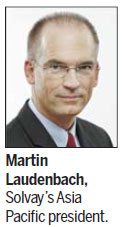Auto Special: Chemical giant Solvay eyeing up nation's sustainable auto sector
Solvay SA, one of the world's largest chemicals groups, plans to deploy more products and resources to support China's automobile market during the next few years. The group hopes this will fuel the industry's robust and ecologically sustainable growth and make transport cleaner, safer and more efficient.
Currently, China is the largest automotive market in the world in terms of new vehicles being built. The electrical vehicle segment is one of China's seven emerging strategic industries. The country is expected to reach automobile production capacity of 2 million and cumulative sales volume of more than 5 million by 2020.
While carrying out further economic transformation and industrial upgrades, many Chinese cities and automotive enterprises are eager to seek solutions and tackle problems such as air pollution and energy consumption caused by heavy automobile use.
"With China seeking 'smart' growth in the coming years, sustainable mobility is all the more important in the vast and highly populated country, where economic growth has led to significant expansion of transport and infrastructure, as well as many environmental issues," said Martin Laudenbach, Solvay's Asia Pacific president, who has more than 20 years experience in the chemical industry.
Solvay invested heavily in both its manufacturing and innovation facilities in China in the past three decades and said it will continue to invest in clean transport in the next few years.
The group shifted its market focus to high-tech new material research and development, for sustainable 'greener' automobiles. This includes materials such as silica, engineering plastics, emerging bio-chemicals, coating materials and special chemicals.
The Belgian company plans to focus on four priorities, new materials for lightweight vehicles, electrification, powertrain efficiency and green technology, to expand its automotive market presence in China.
Lightweight materials, particularly engineered polymers, can reduce the weight of a vehicle's structural and semi-structural parts or mechanical components to lower energy consumption.
Electrification solutions such as lithium salts have outstanding electrochemical properties and high stability, which extend the life and increase performance of batteries in electric vehicles.
Powertrain efficiency products made with rare earth based and mixed oxide formulations can improve the performance of automotive catalytic converters. This minimizes carbon dioxide emissions to help meet environmental regulations.
Green and clean technology, such as highly dispersible silica, or HDS, can reduce the rolling resistance of tires by up to 7 percent while maintaining safety, low fuel consumption and carbon dioxide emissions.
"These solutions not only reduce environmental impacts, but also improve energy efficiency and reduce costs," said Laudenbach.
The Michelin Challenge Bibendum is a global summit dedicated to sustainable mobility. At the latest meeting these solutions were highlighted, particularly those that lower fuel consumption and CO2 emissions and bolster city transport, such as electric cars.
An example of Solvay's role in sustainable mobility is the Solar Impulse 2, an airplane that uses 6,000 Solvay components to run on solar energy. This pioneering project helped many of Solvay's sustainable transport solutions go to market.
"The plane will begin its first world tour in 2015 and China will be a major stop. It is part of our dream in the area of new energy development," Laudenbach said.
Solvay has more than 2,900 employees in China who work at 17 manufacturing facilities and four research and innnovation centers across the country, including locations in Shanghai, Zhenjiang and Qingdao. The group's net sales reached 760 million euros ($861 million) in China in 2013, which ranked the country as the company's largest sales market in the Asia-Pacific region.
"Traditionally, we are considered as a chemical supplier. This definition has certainly changed under the current global economic setting," said Laudenbach. "We are looking to supply sustainable solutions to go be-yond our previous businesses to enter new fields such as providing formulas and customized services to Chinese customers."
"Sustainable mobility will be a real opportunity for China to leapfrog other parts of the world to become a competitive player in the global automobile market. We are ready to support China in this process with our own pioneering new materials and technologies" said Laudenbach.
zhuanti@chinadaily.com.cn

(China Daily 02/02/2015 page18)














